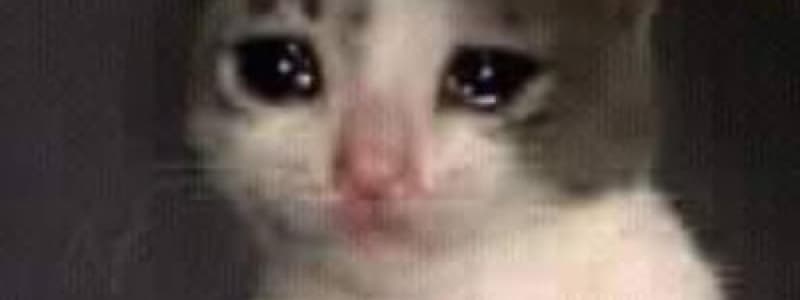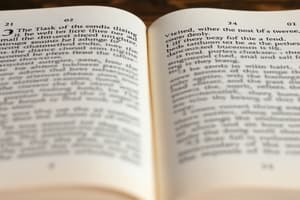Podcast
Questions and Answers
What is the meaning of the term 'Medieval'?
What is the meaning of the term 'Medieval'?
- Dark Age of literature
- Enlightenment Period
- Middle Age (correct)
- Renaissance period
Which period is characterized by an increased interest in Greek classical values and art?
Which period is characterized by an increased interest in Greek classical values and art?
- Renaissance and Reformation period (correct)
- Medieval period
- Enlightenment Period
- Neoclassical Period
What is the primary focus of literature in the Medieval period?
What is the primary focus of literature in the Medieval period?
- Promoting classical values and art
- Defining common sense and order
- Exploring human nature through tragedy and comedy
- Religious themes and allegory (correct)
Which author and literary piece is associated with the Renaissance and Reformation period?
Which author and literary piece is associated with the Renaissance and Reformation period?
What is the meaning of the term 'Neoclassical'?
What is the meaning of the term 'Neoclassical'?
What is a characteristic of literature in the Enlightenment Period?
What is a characteristic of literature in the Enlightenment Period?
What is the primary focus of the literature during the Romantic Period?
What is the primary focus of the literature during the Romantic Period?
Which author is associated with the literary piece 'Gulliver's Travels'?
Which author is associated with the literary piece 'Gulliver's Travels'?
What is the literary device characterized by the attribution of human characteristics to non-human entities?
What is the literary device characterized by the attribution of human characteristics to non-human entities?
What is the primary characteristic of the literature during the Victorian Period?
What is the primary characteristic of the literature during the Victorian Period?
Which literary period is also known as 'The Era of Enlightenment and Realism'?
Which literary period is also known as 'The Era of Enlightenment and Realism'?
Who is the prominent author associated with the poem 'The Prelude'?
Who is the prominent author associated with the poem 'The Prelude'?
What does the Greek word 'mythos' mean?
What does the Greek word 'mythos' mean?
What is the main purpose of etiological myths?
What is the main purpose of etiological myths?
What is the key difference between mythology and legend?
What is the key difference between mythology and legend?
What is the focus of historical myths?
What is the focus of historical myths?
Which of the following goddesses is associated with astronomy?
Which of the following goddesses is associated with astronomy?
What is the primary subject of psychological myths?
What is the primary subject of psychological myths?
What is the term for the collection of stories that deal with various aspects of life and the world?
What is the term for the collection of stories that deal with various aspects of life and the world?
Which of the Furies is responsible for punishing moral crimes?
Which of the Furies is responsible for punishing moral crimes?
What is the role of Lachesis in the destiny of men?
What is the role of Lachesis in the destiny of men?
Which of the following is a type of poetry associated with the muse Erato?
Which of the following is a type of poetry associated with the muse Erato?
Which of the following is a type of being that is partly divine and partly mortal?
Which of the following is a type of being that is partly divine and partly mortal?
What is the primary focus of classical Greek mythology?
What is the primary focus of classical Greek mythology?
What do the three works, Theogony, Iliad, and Odyssey, serve as?
What do the three works, Theogony, Iliad, and Odyssey, serve as?
Which of the following is NOT one of the Olympians?
Which of the following is NOT one of the Olympians?
What is the Roman equivalent of the Greek god Eros?
What is the Roman equivalent of the Greek god Eros?
What do the Nereids and Oceanids represent in Greek mythology?
What do the Nereids and Oceanids represent in Greek mythology?
What is the role of the Fates in Greek mythology?
What is the role of the Fates in Greek mythology?
Flashcards are hidden until you start studying
Study Notes
Medieval Period (455 BCE - 1485 CE)
- Also known as the Dark Age of literature
- Characterized by sermons, prayers, lives of saints, and homilies
- Religious literature, including the Bible and works by Christian mystics, were prominent
- Allegory, a story, poem, or picture with hidden meaning, was a popular literary device
- Notable work: Beowulf by an anonymous author
Renaissance and Reformation Period (c. 1485 - 1660 CE)
- Also known as the Period of Rebirth
- Reformation refers to the split between the Roman Catholic Church and the Protestant Church
- Characterized by increased interest in Greek classical values and art
- Religion and faith played a major role, but not as the central theme
- Literature explored human nature through tragedies and comedies
- Notable work: Hamlet by William Shakespeare
Enlightenment Period (c. 1660 - 1790)
- Also known as the Neoclassical Period
- Characterized by common sense, order, accuracy, and structure
- Genre of writers showed humans as flawed and relatively more human
- Emotion was seen as a divine force that can influence a person's emotions
- Introduction to Greek and Roman Mythology, which teaches about responsibilities, right and wrong behavior, love, and hate
- Notable works: Theogony by Hesiod, Iliad by Homer, and Odyssey by Homer
- Notable author: Gulliver's Travels by Jonathan Swift
Greek Mythology
- Derived from the Greek word 'mythos' meaning story-of-the-people and 'logos' meaning word or speech
- Study and interpretation of sacred tales or fables
- Collection of stories dealing with various aspects, including origin, animals, cultural values, and the afterlife
- Three major types of mythology: etiological, historical, and psychological
- Minor divinities: Eros, Dionysus, Nymphs, Fates, and Muses
Romantic Period (c. 1790 - 1830)
- Characterized by the celebration of nature, focus on the individual, and spirituality
- Emphasis on emotion, imagination, and personification
- Idealization of women and the common man
- Notable work: The Prelude by William Wordsworth
Victorian Period (c. 1832 - 1901)
- Characterized by literature coming closer to daily life, reflecting its practical problems and interests
- Literature became a powerful instrument of human progress
- Notable authors: Tennyson, Browning, Carlyle, and Ruskin
- Notable work: Theatre of the Absurd by Samuel Beckett
Studying That Suits You
Use AI to generate personalized quizzes and flashcards to suit your learning preferences.




